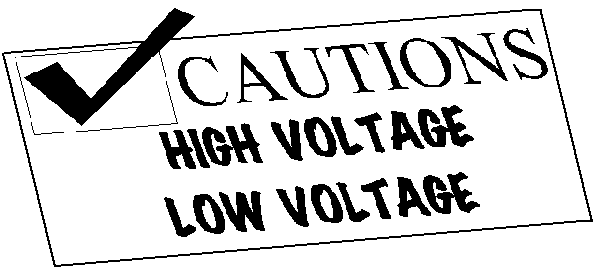

HIGH VOLTAGE SURGE
What is it? Lightning and failed power company equipment.
Catastrophic in nature.
What can you do? Use a good surge protector. Unplug your
RV from commercial power when storms threaten. If you see a "crackling/arcing'
power transformer, unplug. If someone drives a vehicle into a
power pole, unplug.
ARTIFICIAL SURGE
What is it? Similar in effect to the high voltage surge above,
but caused by someone (you?) who interferes with the power system.
Examples: • Tearing power connections apart with a vehicle
or tripping over them. • Running a generator that isn't properly
isolated from the commercial power system (Do NOT ever run
a generator without disconnecting from commercial power when you're
"sharing" power with others. Do NOT trust an automatic
transfer switch to protect your RV or your neighbors.) •
Running a faulty appliance in your RV that "melts down."
• Plugging in faulty power adapters. All these may affect
your neighbors on the same system.
What can you do? Pay attention to what you're doing. Artificial
surges are the most common cause of severe damage (the kind that
can wipe out your whole RV--and your neighbor's). DON'T BURN UP
YOUR NEIGHBOR'S RV!
HIGHER THAN NORMAL VOLTAGE
What is it? Not a surge, but voltage in excess of 130VAC for
an extended period.
What will it do? Burn out or cause premature failure of
lights, refrigerator heating element, sensitive electronics in
any number of appliances (including things like automatic coffee
makers with timers).
What can you do? Every RVer should have a simple, cheap
voltage monitor plugged into one of the easily-seen AC receptacles
in their RV. If you don't have one, connect your multimeter.
LOWER THAN NORMAL VOLTAGE
What is it? The most common cause of damage to electrical items
in an RV. It is any sustained voltage of 104VAC or less. Common
at RV gatherings as well as at campgrounds with insufficient power
to sites.
| What will it do? | |
| Electric Motors | Low Voltage means higher amperage. That means more heat, slower running and early failure. LV also means that motors with a starting switch (see Air Conditioners below) like washing machines may not reach starter winding cutout speed and this will result in motor damage. Some motors, however, will just run slow and not be damaged. Do you want to risk yours to find out? |
| Air Conditioners | LV = Motors die early as above. Also, compressors (constant horse power loads) will be severely stressed and burn out. |
| Fluorescent Lamps | LV = Constant cycling of circuit board and ballast. That means premature failure. |
| TV/VCR/etc. | LV = Heat = premature failure of components. (And see Power Supplies below.) |
| Refrigerator | LV = Relays fail to operate properly; unit goes into search mode from 120VAC to LP to 12VDC constantly and thoroughly confuses circuit board that, in consequence, fails. |
| Furnace & Water Heater | LV = Slow fan, which = too much heat in furnace enclosure, which destroys circuit board. Water heaters with auto ignition have circuit board that may fail or not operate properly. |
| Microwave Oven | LV = Fan runs slow. Fan cools a magnetron (the cooking element). Hot magnetrons die if run too long in this condition. |
| Power Supplies | LV = Some power supplies will run too hot (switching power supplies); some just won't regulate properly (linear type). Either, if not running properly, are components of and may damage, computer equipment, TVs, VCRs and the like. |
WHAT CAN YOU
DO?
Monitor your electrical system for Low Voltage as described above
for High Voltage.
When at an RV gathering, like an Escapade, be considerate. Don't
be an energy hog.
Some items won't necessarily be damaged by low voltage. They just won't work or won't work well. Examples: incandescent lamps, heaters, clocks, non-automatic coffee makers.
Some appliances are known to fail even, when turned off, and create disasters. Examples: toasters, automatic coffee makers and heating items which should not be plugged in when not in use, in your RV or at home.